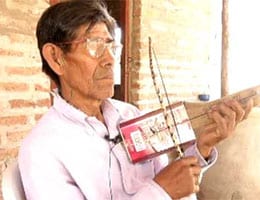 The term monochord has its etymological origin in the French language. It is an adjective that can be used in different contexts.
The term monochord has its etymological origin in the French language. It is an adjective that can be used in different contexts.
The first meaning of monochord that the Royal Spanish Academy ( RAE ) mentions in its dictionary refers to a musical instrument that has a single string . In this framework, it can be said that the monochord is a monochord instrument since it has a single string.
The monochord was used to accompany the monody in unison. In the field of music , the term monody usually refers to a piece that is written for a single voice, that is, it only has one melody. It is therefore opposed to polyphony .
It should be noted that over the centuries, this concept has varied, to the point of having two possible meanings:
* If understood as monophony , it is the typical musical texture of the Middle Ages , such as Gregorian chant, where all sounds, both those produced by artificial instruments and vocal ones, execute the same melody simultaneously, either at a octave away or in unison;
* as an accompanied melody it refers to a style originating from the 16th century in Florence, characterized by the presence of a solo voice and a group of instrumentalists who accompany it.
It is possible to classify the monochord in the group of pinched and rubbed chordophones . It was invented by Pythagoras, the acclaimed Greek philosopher, to complement his research on intervals and different tunings.
Another monochord instrument is the novike , which can also be written nobike . Due to its mode of action , it belongs to the bowed rope group. The term does not have an equivalent in our language, since it defines the action that the jaguar performs when it sharpens its nails against the trunk of a tree.
To make this monochord instrument sound, a bow is used, whose name is checne»c , with which the tensioned string is rubbed. In the first versions of the novike the rope, called Iket , was made from peccary mane, a placental mammal also called "mountain pig"; However, after the Spanish invasion they began to use horsehair.
Regarding the body of the novike, its sound box is made from a tin box, an armadillo shell or a gourd, making in any case an opening in its upper part. According to a legend, a man considered very ugly received a novike as a gift and since then he began to conquer the women of his village with his music.
 Monochord sounds , on the other hand, are those that reiterate the same note . By extension, monotonous is described as monotonous : something that develops without changes, always in the same way.
Monochord sounds , on the other hand, are those that reiterate the same note . By extension, monotonous is described as monotonous : something that develops without changes, always in the same way.
For example: “The attacks of the local team, with a monotonous tone, failed to bring danger to the rival goal” , “The most acclaimed writers today are monotonous on an ideological level, none of them dare to exhibit a thought that is politically incorrect” , “The religious man's monotonous speech bored many of the parishioners, who began to yawn in their seats.”
It is usually stated that a person speaks in a monotone when there are no variations in tone in their statements. These individuals express themselves without changing the volume of their voice and without intensifying any particular word: this is why listeners may have difficulty maintaining attention.
A monotone film , meanwhile, does not have plot twists nor does it cause emotional impacts in the viewer. This makes it boring because all its scenes are similar to each other. The same can be expressed regarding a book that maintains an identical tone throughout the pages.
